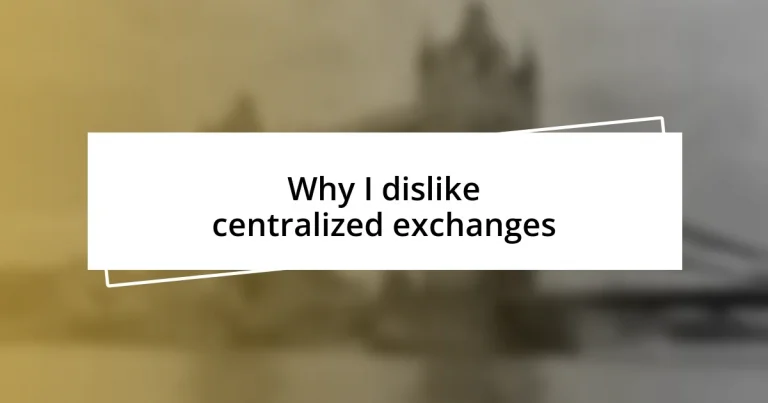Key takeaways:
- Centralized exchanges (CEXs) require users to trust them with asset custody, presenting risks such as hacking, regulatory changes, and liquidity issues.
- User privacy is compromised on CEXs, as they demand extensive personal information and can monitor trading activity, raising concerns about data security.
- Decentralized exchanges (DEXs), peer-to-peer trading platforms, and crypto wallets provide alternative options, allowing users greater control, privacy, and direct trading opportunities.
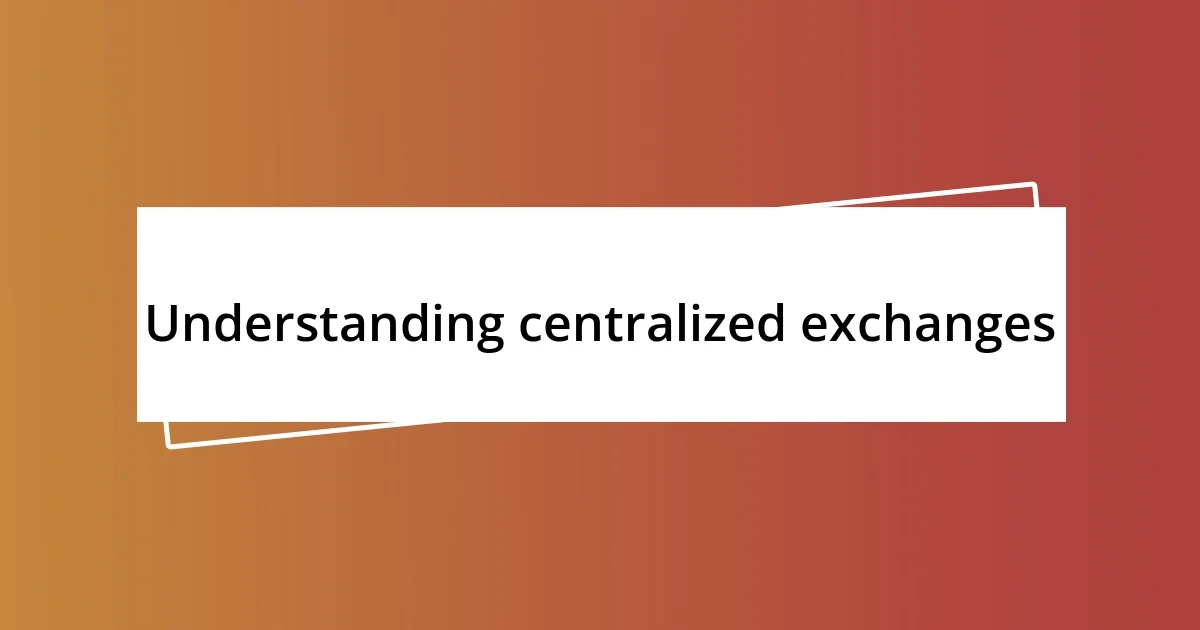
Understanding centralized exchanges
Centralized exchanges, or CEXs, are platforms where users can buy, sell, and trade cryptocurrencies, and they’re quite popular because of their convenience. I remember my first experience on a CEX: it felt almost like walking into a bustling market, where I could quickly find what I wanted. But what about the security of my funds? That’s a question I’ve often pondered.
What often frustrates me about centralized exchanges is how they hold custody of our assets. This means users are required to trust the platform to keep their cryptocurrencies safe, which can be daunting. Have you ever thought about how much control you’re giving up by leaving your assets on an exchange? It can feel unsettling to rely on a third party, especially when stories of hacks and mismanagement are all too common.
Furthermore, with centralized exchanges, the process can be opaque. Fees can be hidden or manipulated, and customer support often lags, leaving you stranded in an ocean of frustration. I’ve found myself waiting for responses while my funds sat idle—it’s a stark reminder that while these exchanges offer ease, they can also feel impersonal and untrustworthy.
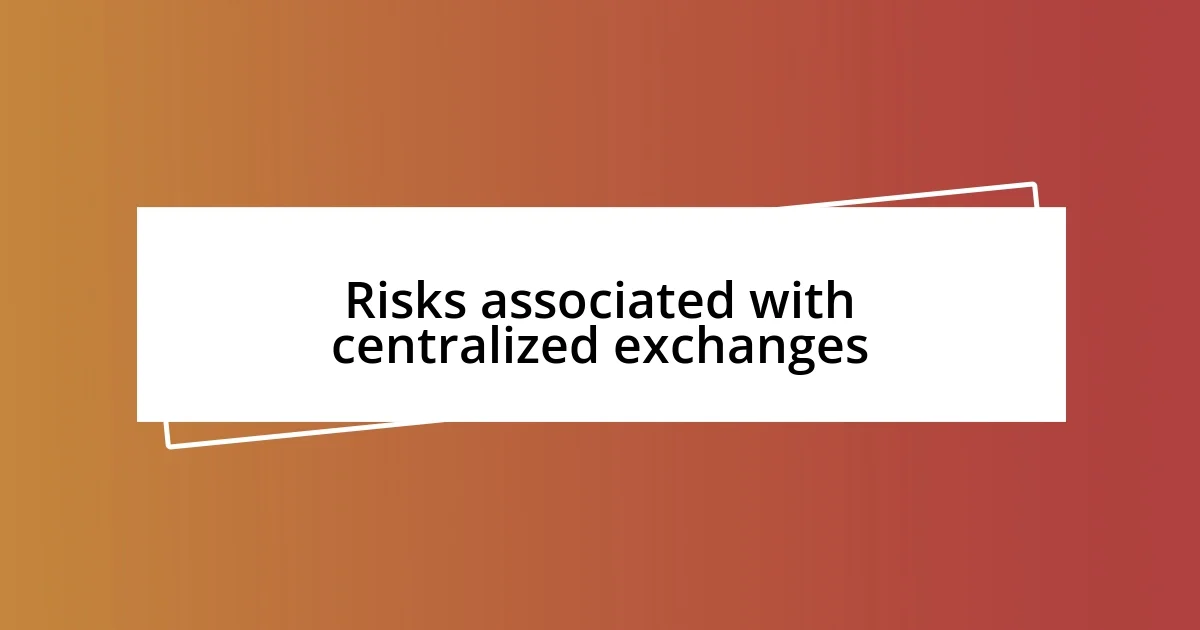
Risks associated with centralized exchanges
The risks associated with centralized exchanges are multifaceted and often concerning. For one, these platforms can be susceptible to hacking incidents—like when I read about the notorious Mt. Gox hack, where countless users lost their funds overnight. It was a sobering reminder of how vulnerable my assets could be when entrusted to a third party. Have you ever considered how quickly everything could vanish due to an incident entirely out of your control? It’s a risk that keeps me up at night.
Moreover, the potential for sudden regulatory changes can create an unpredictable environment. I experienced this firsthand when a favorite exchange announced a temporary suspension of services due to new regulations; I felt a wave of panic. When your access to funds can be restricted by external legal matters, it can be incredibly disconcerting. I started wondering—what happens to my investments if an exchange no longer aligns with the law?
Finally, there’s the issue of liquidity. I once attempted to sell a smaller altcoin on a CEX only to realize that my order was sitting for hours with no buyers. The market depth can be eerily shallow, leaving you vulnerable if you need to liquidate quickly. The emotional rollercoaster of watching my asset stagnate is something I wouldn’t wish on anyone.
| Risks | Description |
|---|---|
| Security Vulnerabilities | Centralized exchanges are prone to hacks, putting user funds at risk. |
| Regulatory Changes | Sudden regulations can restrict access to funds, creating instability. |
| Liquidity Issues | Limited market depth might hinder quick selling, leading to delays. |
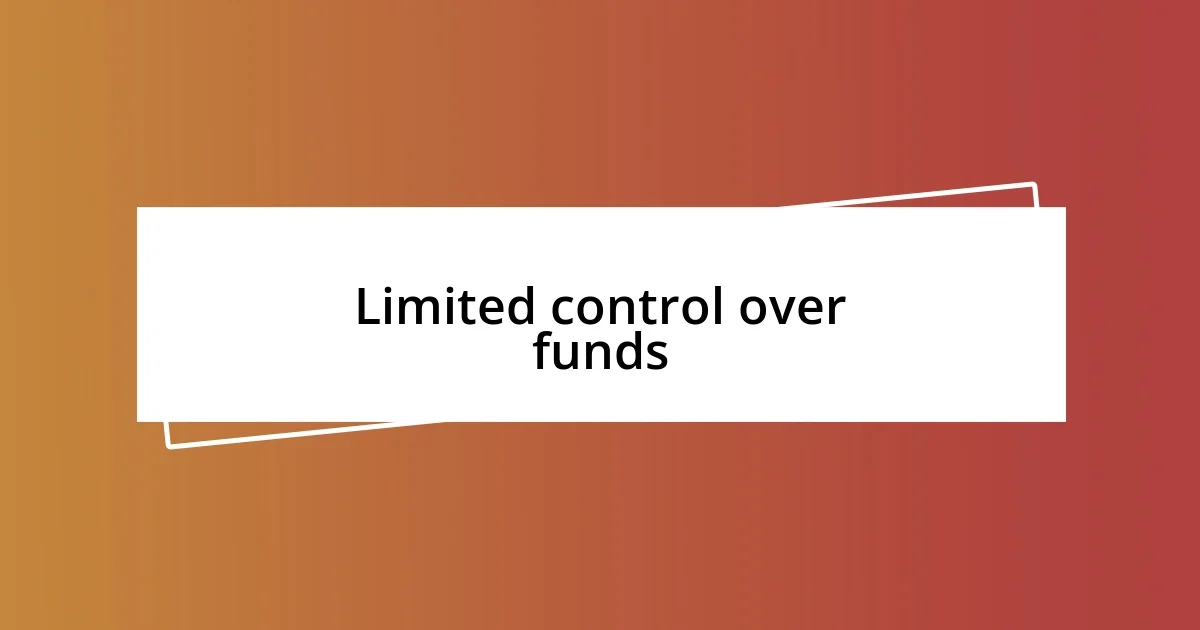
Limited control over funds
There’s something unnerving about knowing that I don’t truly possess my cryptocurrencies when they’re stuck on a centralized exchange. In my experience, it’s like handing my prized possession over to someone else, hoping they’ll take care of it. Yet, when I see horror stories of users losing everything due to a platform’s mismanagement, it solidifies my belief that I’d rather have my funds in my own hands. The emotional distress of wondering if my assets are genuinely secure can be overwhelming.
- Centralized exchanges maintain custody of user funds, creating a trust-based relationship that’s often precarious.
- The fear of losing access to my assets due to a platform’s poor security measures keeps me alert—I’ve felt that anxiety when logging into my account.
- The decision to withdraw funds can become a mental tug-of-war, as the convenience of staying on an exchange often battles with the need for control.
When I think back to times I’ve felt trapped on a CEX, I recall an incident where I attempted to move a portion of my assets. The withdrawal restrictions and lengthy processing times felt like a chokehold on my financial freedom. I remember feeling a mix of frustration and helplessness. Why should anyone else dictate when I can access my money? These experiences only cement my discomfort with relinquishing control over my own funds.
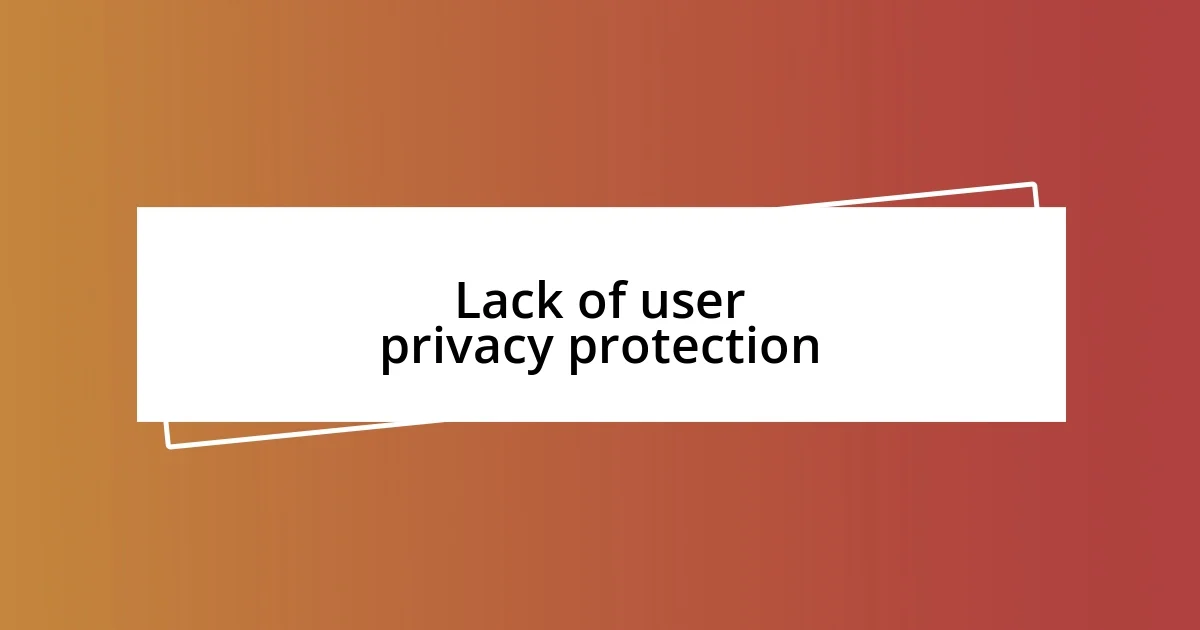
Lack of user privacy protection
When I think about user privacy on centralized exchanges, it makes me uneasy. Platforms often require extensive personal information—like my name, address, and even banking details—just to create an account. I remember registering for one exchange and feeling a pit in my stomach as I plugged in my data, wondering if this information was really safe from prying eyes. Have you ever felt that nagging doubt about how your data is being stored and used?
In many cases, these exchanges have the power to track my trades and monitor my activity. It’s unsettling to know that my financial moves are not just my business; someone else is watching. One time, I noticed targeted ads pop up after I’d searched for a specific cryptocurrency. It made me question—was my private information being sold? The idea that my financial choices could be exploited for profit is genuinely disconcerting.
Moreover, compliance with regulations often means that exchanges have to disclose my information to authorities if requested. I experienced this when I read about a user who had their account frozen due to irregularities spotted by the exchange. It hit me—what if that happened to me? The lack of privacy protection not only increases vulnerability but also raises a flag about how much control I truly have over my identity and financial decisions in a centralized environment.
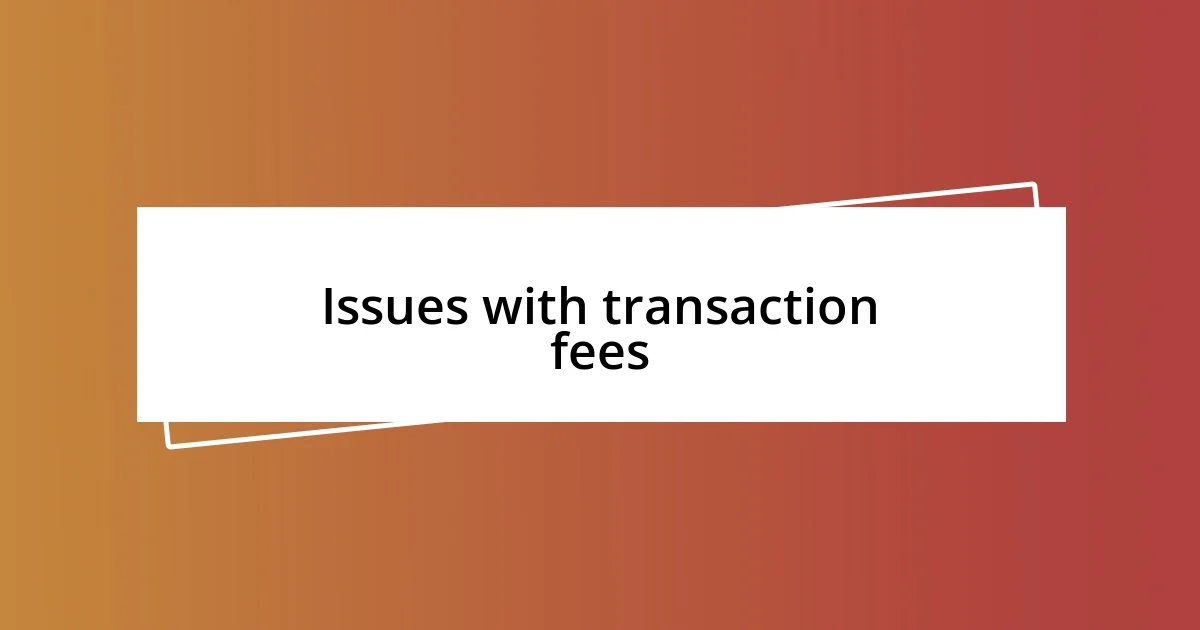
Issues with transaction fees
Transaction fees on centralized exchanges can really disrupt the flow of trading. I remember the first time I wanted to make a trade and saw the fees listed—my excitement quickly turned into frustration. There’s a certain sting knowing that a chunk of my investment will vanish as a fee, often without providing me with any real added value. Have you ever felt that sinking feeling right before confirming a transaction, knowing that fees are eating away at your profits?
In my experience, these fees can vary significantly depending on market conditions and the exchange’s internal policies. I once faced a situation where I left funds idle just because the fee for withdrawing them was unreasonably high—a decision I still regret. It’s a harsh reality that centralized exchanges often charge fees that don’t just feel excessive, but can be misleading, making it hard to calculate true profitability. Why is it that a service that promises to facilitate trading ends up nickeling and diming its users?
On top of that, the unpredictability of fees adds a layer of anxiety to trading. I recall a high-volatility day when I wanted to make a quick move, only to find out the transaction costs surged unexpectedly. It felt like the exchange was capitalizing on my need for speed. That’s a chilling thought, right? Knowing that the very platforms we’re reliant on can turn our intentions into fees that disproportionately affect our investments. In a world where every dollar counts, it’s hard to ignore how centralized exchanges often prioritize their profit margins over users’ financial well-being.
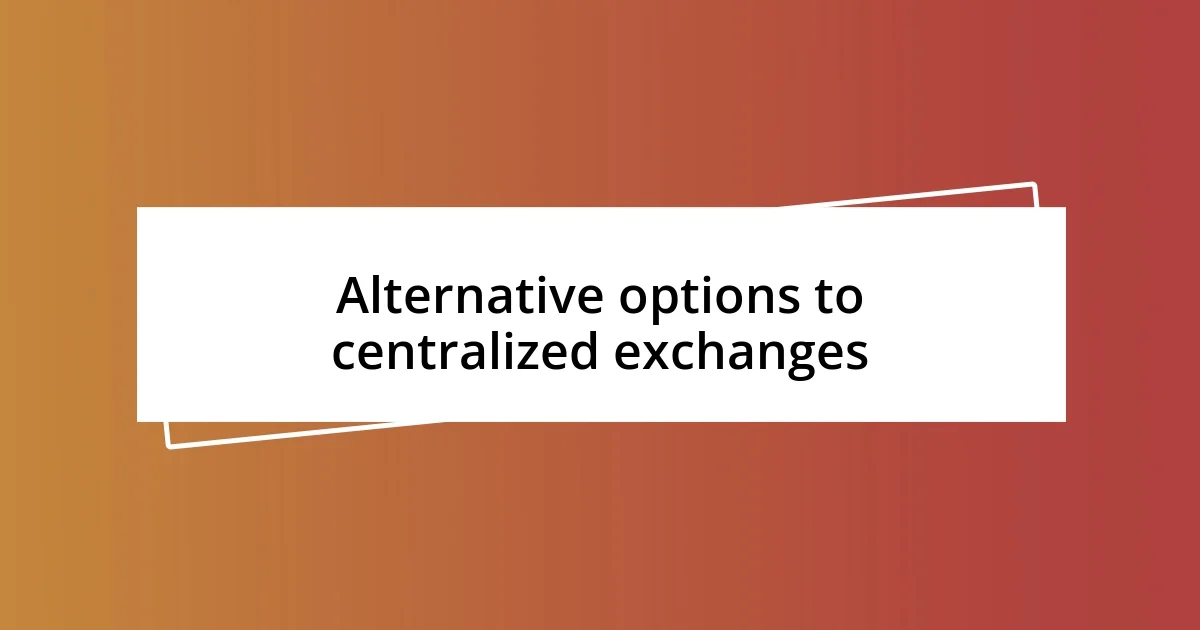
Alternative options to centralized exchanges
When exploring alternatives to centralized exchanges, decentralized exchanges (DEXs) stand out as a popular option. I vividly remember my first experience using a DEX—it felt liberating. Instead of handing over my personal information, I simply connected my wallet and started trading. It made me realize how easy it could be to maintain control over my assets while enjoying a sense of anonymity. Have you ever longed for a trading experience that prioritized your privacy?
Another alternative I’ve found intriguing is peer-to-peer (P2P) trading platforms. They allow users to buy and sell directly with one another, bypassing the need for a central authority altogether. I once completed a transaction with a seller I found online, and it felt like I was partaking in a grassroots community, sharing knowledge and strategies. Wouldn’t you agree that engaging directly with other traders adds a level of transparency often missing from centralized platforms?
Lastly, crypto wallets with integrated trading features offer a seamless way to swap cryptocurrencies without needing to go through an exchange at all. I’ve turned to these wallets when I want to avoid the headaches of accounts and fees. It’s refreshing to trade directly while feeling a sense of ownership over my assets. What if the future of trading isn’t about centralized platforms but about empowering individual users like you and me?
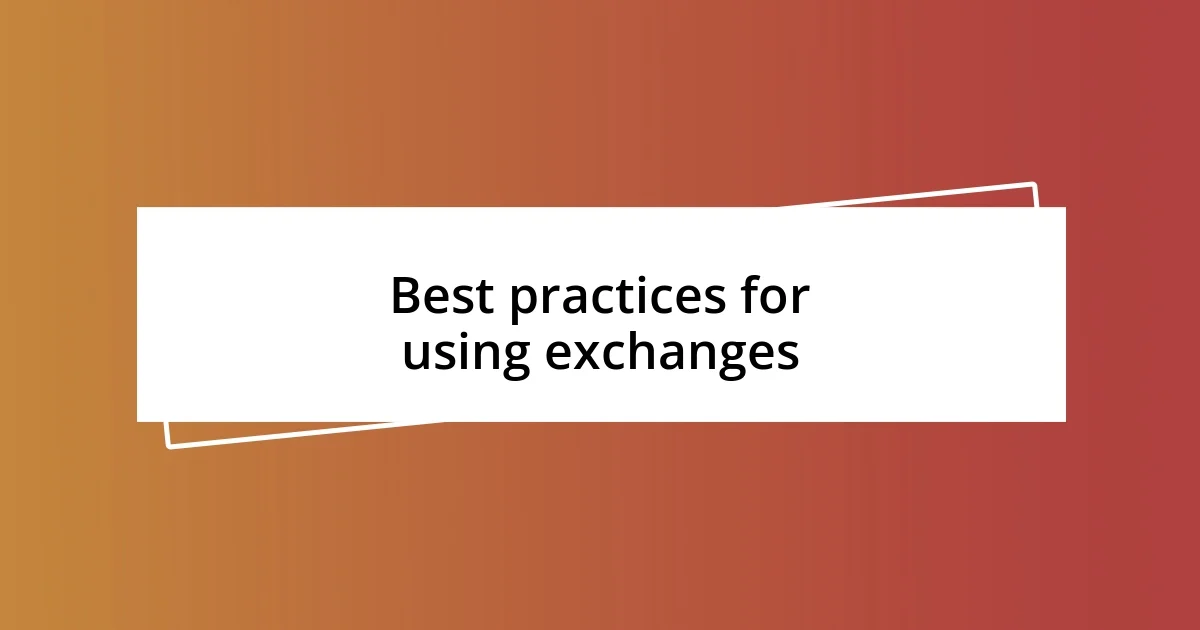
Best practices for using exchanges
To navigate the complexities of centralized exchanges effectively, it’s crucial to have a well-thought-out strategy. I’ve learned to set strict trading limits. A few times, I dove headfirst into trades without considering my stop-loss levels, only to watch my investments take a nosedive. It’s a hard lesson learned! Have you ever experienced the anxiety of watching asset prices fluctuate wildly, wishing you had taken a step back? Establishing limits can help maintain your sanity and ensure you trade more wisely.
Another practice I swear by is periodically reviewing the exchange’s security features. Each time I log in, I analyze the safety protocols in place, like two-factor authentication or withdrawal confirmations. There was one instance when I ignored a potential security update, and it left me feeling vulnerable—no one wants to feel insecure with their trades. Wouldn’t you agree that peace of mind is worth a few extra moments spent on due diligence?
Lastly, it’s essential to keep records of your trades. I’ve often found myself scrambling to retrace my steps when tax season arrives because I didn’t track my transactions properly. It’s surprisingly easy to lose clarity over time when trades pile up. I recommend using spreadsheets or dedicated software to document your trading history. How often do you think about the long-term implications of your current trades? By keeping detailed records, we empower ourselves to make better, more informed trading decisions in the future.












